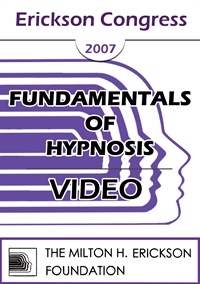- Average Rating:
- Not yet rated
- Topic Areas:
- Fundamentals of Hypnosis | Hypnosis | Phenomenology | Hypnotic Induction | Trance | Tailoring
- Categories:
- Brief Therapy Conference | Brief Therapy Conference 2008
- Faculty:
- Jeffrey Zeig, PhD
- Course Levels:
- Master Degree or Higher in Health-Related Field
- Duration:
- 2:23:04
- Format:
- Audio and Video
- Original Program Date:
- Dec 11, 2008
- Short Description:
- Hypnosis is not a thing, but a way that things happen. To make hypnosis happen a clinician needs to understand the underlying architecture of trance. Eliciting systemic components elicits trance. The grammar, context and relational elements of eliciting these components will be explained. We will develop an induction model based on three steps. This workshop will consist of lecture, demonstration and small group practice.
- Price:
- $29.00 - Base Price
- Average Rating:
- Not yet rated
- Topic Areas:
- Hypnosis | Fundamentals of Hypnosis | Phenomenology | Trance
- Categories:
- Brief Therapy Conference | Brief Therapy Conference 2010
- Faculty:
- Jeffrey Zeig, PhD
- Course Levels:
- Master Degree or Higher in Health-Related Field
- Duration:
- 2:15:55
- Format:
- Audio and Video
- Original Program Date:
- Dec 10, 2010
- Short Description:
- Deconstructing trance into phenomenological components allows the hypnotherapist to target intensions strategically. Hypnosis will be divided into social, psychological, and interpersonal elements. Lecture, demonstration, and small group practice.
- Price:
- $29.00 - Base Price
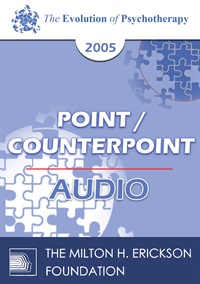
- Average Rating:
- Not yet rated
- Topic Areas:
- Point/Counterpoint Sessions | Hypnosis | Phenomenology | Psychotherapy
- Categories:
- Evolution of Psychotherapy | Evolution of Psychotherapy 2005
- Faculty:
- Jeffrey Zeig, PhD | Marsha Linehan, PhD
- Duration:
- 1 Hour 19 Minutes
- Format:
- Audio Only
- Original Program Date:
- Dec 10, 2005
- Short Description:
- Hypnosis is commonly thought of as a tool to enhance the therapy. It also can be used as a "lens." The phenomenology of hypnosis can help us to understand an essential aspect of the trance state, the symptom state, the solution state and the therapist's state, thereby providing new options for treatment.
- Price:
- $15.00 - Base Price
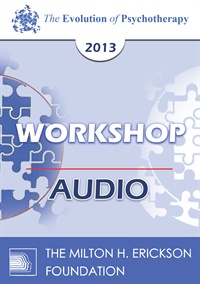
- Average Rating:
- Not yet rated
- Topic Areas:
- Hypnosis | Workshops | Phenomenology | Psychotherapy | Therapist Development
- Categories:
- Evolution of Psychotherapy | Evolution of Psychotherapy 2013
- Faculty:
- Jeffrey Zeig, PhD
- Duration:
- 2 Hours 14 Minutes
- Format:
- Audio Only
- Original Program Date:
- Dec 12, 2013
- Short Description:
- Understanding hypnosis as a composition of phenomenological elements facilitates induction. Basic methods will be described and demonstrated. Attendees will practice induction methods and learn indications for applying “hypnotherapy without trance” to empower clinical methods in any form of psychotherapy.
- Price:
- $15.00 - Base Price
- Average Rating:
- Not yet rated
- Topic Areas:
- Invited Addresses | Existential Therapy | Psychotherapy | Phenomenology
- Categories:
- Evolution of Psychotherapy | Evolution of Psychotherapy 1985
- Faculty:
- Ronald Laing, MD | Thomas Szasz, MD
- Course Levels:
- Master Degree or Higher in Health-Related Field
- Duration:
- 1:26:01
- Format:
- Audio and Video
- Original Program Date:
- Dec 12, 1985
- Short Description:
- Educational Objectives: To know the theory behind the use of social phenomenology and existential philosophy in psychotherapy
- Price:
-
Sale is $29.00
price reduced from Base Price - $59.00
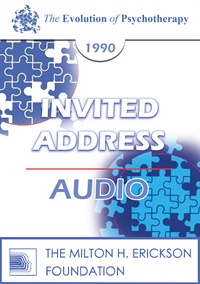
- Average Rating:
- Not yet rated
- Topic Areas:
- Invited Addresses | Psychotherapy | Therapist Development | Existential Therapy | Humanistic Psychology | Phenomenology
- Categories:
- Evolution of Psychotherapy | Evolution of Psychotherapy 1990
- Faculty:
- James Bugental, PhD | Erving Polster, PhD
- Duration:
- 1:30:07
- Format:
- Audio Only
- Original Program Date:
- Dec 16, 1990
- Short Description:
- Psychotherapy loses its soul when it forgets the mystery at its center. In this sweeping address, Bugental challenges the field’s drift toward objectification and calls therapists back to the subjective realm where meaning, intention, and transformation arise. Through clinical stories, philosophical reflection, and experiential exercises, he argues that real change unfolds when clients reclaim their inner life rather than treating themselves as objects to be fixed.
- Price:
- $15.00 - Base Price

- Average Rating:
- Not yet rated
- Topic Areas:
- Workshops | Ericksonian Hypnosis and Therapy Techniques | Hypnosis | Communication | Psychotherapy | Phenomenology
- Categories:
- Evolution of Psychotherapy | Evolution of Psychotherapy 1990
- Faculty:
- Jeffrey Zeig, PhD
- Duration:
- 2 Hours 23 Minutes
- Format:
- Audio Only
- Original Program Date:
- Dec 12, 1990
- Short Description:
- Hypnosis is a method of injunctive communication used to help patients elicit previously dormant potentials. The phenomenology of Ericksonian hypnosis will be developed through lecture, demonstration and practice exercises.
- Price:
- $15.00 - Base Price
- Average Rating:
- Not yet rated
- Topic Areas:
- Fundamentals of Hypnosis | Hypnosis | Phenomenology | Hypnotic Induction
- Categories:
- Erickson Congress | Erickson Congress 2007
- Faculty:
- Jeffrey Zeig, PhD
- Course Levels:
- Master Degree or Higher in Health-Related Field
- Duration:
- 1:50:01
- Format:
- Audio and Video
- Original Program Date:
- Dec 07, 2007
- Short Description:
- By ascertaining the "lived experience" of a person's trance state, we can create tailored inductions. We will explore the fundamental model of Ericksonian inductions.
- Price:
-
Sale is $29.00
price reduced from Base Price - $59.00

- Average Rating:
- Not yet rated
- Topic Areas:
- Short Courses | Hypnosis | Phenomenology
- Categories:
- Erickson Congress | Erickson Congress 2007
- Faculty:
- Walter Tschugguel
- Duration:
- 1:19:45
- Format:
- Audio Only
- Original Program Date:
- Dec 07, 2007
- Short Description:
- According to Helmholtz, reality consists of two abstractions. One is an independent or "objective" world that needs to be adjusted by a related or "subjective" world. However, a culturally determined atmosphere of detrimental double bind communication prevents experiencing both abstractions simultaneously, i.e. yielding chronic complaints. This workshop shows how easily one-sided behavior can be adjusted through utilizing a given individual's ambivalence via eliciting hypnotic phenomenology.
- Price:
- $15.00 - Base Price
- Average Rating:
- Not yet rated
- Topic Areas:
- Fundamentals of Hypnosis | Hypnosis | Hypnotic Phenomena | Phenomenology
- Categories:
- Erickson Congress | Erickson Congress 2011
- Faculty:
- Stephen Gilligan, PhD
- Course Levels:
- Master Degree or Higher in Health-Related Field
- Duration:
- 1:23:04
- Format:
- Audio and Video
- Original Program Date:
- Dec 09, 2011
- Short Description:
- This workshop overviews the basic phenomenological shifts that occur in hypnotic trance, both spontaneously and through suggestion, and describes how they may be positively utilized for therapeutic change.
- Price:
- $29.00 - Base Price
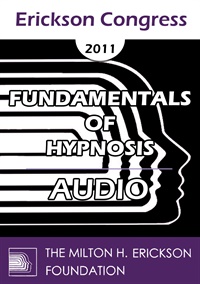
- Average Rating:
- Not yet rated
- Topic Areas:
- Hypnosis | Fundamentals of Hypnosis | Hypnotic Phenomena | Phenomenology
- Categories:
- Erickson Congress | Erickson Congress 2011
- Faculty:
- Bill O'Hanlon, MS
- Duration:
- 1:29:57
- Format:
- Audio Only
- Original Program Date:
- Dec 11, 2011
- Short Description:
- In this session, you will learn about trance phenomena, the experiential distortions that often accompany hypnosis. You will learn how and why to evoke them in induction and treatment.
- Price:
- $15.00 - Base Price
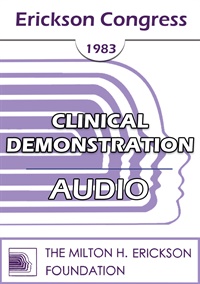
- Average Rating:
- Not yet rated
- Topic Areas:
- Clinical Demonstrations | Pain and Healing | Phenomenology | Hypnotic Phenomena | Trance | Hypnosis
- Categories:
- Erickson Congress 1983 | Erickson Congress
- Faculty:
- Stephen Lankton, MSW
- Duration:
- 58:48
- Format:
- Audio Only
- Original Program Date:
- Nov 28, 1983
- Short Description:
- IC83 Clinical Demonstration 27 - Clinical Use of Trance Phenomena for Therapy and Pain Control - Stephen R Lankton, ACSW
- Price:
- $15.00 - Base Price





